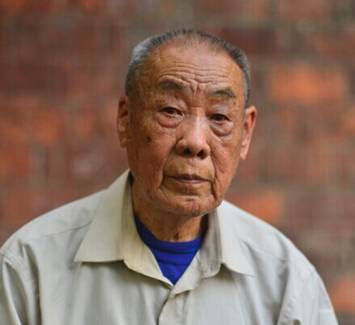File- Surviving Veteran- Xie Fugao

Name: Xie Fugao
Birthplace: Suxian district, Chenzhou city, Hunan province
Birthday: 1927
Recruitment date: 1940
Designation of troops: 38th division, the New 1st Army
(It is an account in the old solder’s own words, though the volunteers cleared it up, they may still be some mistakes. Thanks for your kindly understanding.)
There were 6 siblings of our family. I was the youngest one. When I was 6 years old, my mother died. I was not older than 14 years in 1940. My 4th and 5th older brother have been enrolled into the army (my 5th older brother died in the war, and 4th older brother was found after the victory of Anti-Japanese War). But the chief of our town still asked our family members to join in the army. My father considered that I was just 14 years old, they may not ask me to do so, so he accompanied me to go to the town.
After weighing, I was about 1.5meter high. I did not remember how heavy I was then. I just remembered I was locked in a house after that and delivered to Leiyang in the second day, and then transferred to Hengyang city, Guangxi province, and finally arrived at Duyun, Guizhou province. After 4 or 5 months training, I was dispatched to 2nd company of pionier battalion of 38th division. Our division commander was Sun Liren, battalion commander was Tang Kejin, and company commander was Wang Yun.
The 38th division was dispatched to Myanmar at that time, but our pionier battalion was stayed in Duyun to defend the warehouse for over one year. The first battle in Myanmar failed (the assistant division commander- Qi Xuexi who ever studied in USA died for he was not willing to leave his soldiers behind) and our division removed to India. Our battalion met with the division in India later and trained there for 6 months.
It was dangerous in pionier battalion, we played forward in advance of the troops in every battle. Due to the expansion of troop, the 38th division was expanded as the New 1st Army, and our pionier battalion was expanded as pionier regiment. All officers were promoted. I was promoted as deputy monitor of our team.
After the training, we returned to Myanmar. I was hurt again and was in hospital for another one month. Our troop was in charge of building “monument for Chinese expeditionary forces” then. We spent 2-3months on the construction and collected the corpse of our soldiers along with the construction work. Because there were soldiers from USA, UK, China and Japan, we could only indentify our brothers by the clothes. It was really a hard work. We collected the corpse by operating three handcars. In order to prevent from the attack of Japanese army, we needed to take the weapons with us as well.
More than 200-300 corpses of the soldiers were collected by us. We buried them together under the monument. We returned to China after finishing the construction work.
We were trained to swim in Nanning, Guangxi province for we would be dispatched to fight in Japan. I still remember the day, August 15, 1945, our officer informed us Japan surrendered after USA threw two atomic bombs there. All of us celebrated the victory. The machine gun fired 9 bullets, tututu, tututu, tututu; submachine gun fired 6 bullets, tutu, tutu, tutu; and rifle fired three bullets. And then, all of us said: “put the weapons back in the arsenal , come back to home”.
In 1947, we lost Changchun city and surrendered to liberation army.
The Korea War was broken out in 1950. But because our expeditionary forces ever worked together with USA and UK armies, we were only dispatched to defend the border. In 1952, we were dispatched to Kiamusze. I was not used to living there. In 1953, it was changed to farm, and we became workers there. I submitted the application to come back to Chenzhou city with other people afterward and entered Matian Coal by attending some tests. I suffered badly during the Cultural Revolution.





